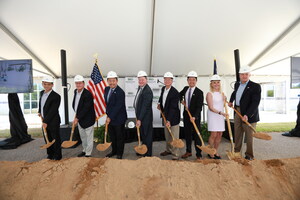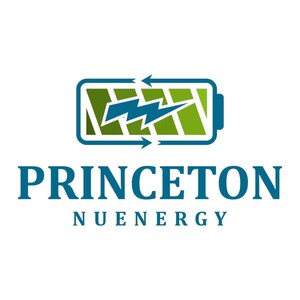Princeton NuEnergy (PNE) Awarded $12M Grant from U.S. Department of Energy (DOE)
BORDENTOWN, N.J., Nov. 18, 2022 /PRNewswire/ -- Princeton NuEnergy Inc. ("PNE", "company"), has been awarded a $12 million grant from the U.S. Department of Energy ("DOE") through DE-FOA-0002680. This grant was established to reduce the nation's dependence on foreign materials, enhance domestic manufacturing capabilities, and create well-paying clean energy jobs. The grant award, comprising a $10 million federal cost share and $2 million recipient cost share, is a testament to the United States' trust in direct recycling and upcycling technologies to advance the growth of emerging renewable technologies such as electric vehicles (EVs) and energy storage systems.
PNE is a U.S.-based innovative clean-tech company focused on recycling, repurposing, and commercializing lithium-ion battery (LIB) materials from EVs, consumer electronics, manufacturing scrap, and energy storage batteries. On October 25th, PNE launched the United States' first end-to-end direct lithium-ion battery recycling pilot production line with Wistron GreenTech in McKinney, Texas. Compared to other LIB recycling technologies, PNE's direct recycling low-temperature plasma-assisted separation process (LPAS™) significantly reduces cost, environmental waste and CO2 emissions, yielding higher critical material recovery rates and material performance. PNE's new 500- ton pilot production line will recycle consumer batteries, LIB manufacturing scrap and spent EV cell batteries.
The funding was granted by the Office of Energy Efficiency & Renewable Energy (EERE) at the DOE under the FOA-0002680: Bipartisan Infrastructure Law (BIL) Electric Drive Vehicle Battery Recycling and Second Life Applications initiative. The Bipartisan Infrastructure Bill was signed into law by President Biden on November 15th, 2021, delegating more than $126 million toward ten projects in the domestic second life applications sector for electric vehicles. In addition to the $12 million in funding directly for operations, PNE is also a sub-recipient of Tennessee Technological University's FOA-0002680 award for mobile charging station development.
The grant adds onto an already successful year of funding with PNE's third DOE award. In 2019, after spinning out from Princeton University research, the company received $250,000 from the SBIR Phase I Fund to support early R&D. Two years later after continued growth and technological development, PNE was awarded an additional $1.15 million from the prestigious SBIR Phase II fund so support further R&D. In May of 2022, PNE closed a $7 million seed funding round led by Wistron Corporation and will soon close a Series A round.
With the allocated funds, PNE will team up with Argonne National Laboratory (ANL), National Renewable Energy Laboratory (NREL), Oak Ridge National Laboratory (ORNL) and University of California, Irvine (UCI) to develop processes aimed to improve end-to-end recycling efficiency. PNE will collaborate on optimizing the approach to automated LIB pack disassembly, cathode-to-cathode upcycling, anode-to-anode recycling/upcycling, electrolyte component recovery, and polyvinylidene fluoride (PVDF) binder recovery.
Dr. Xiaofang Yang, Co-Founder and CTO of PNE, commented, "Winning the DOE grant is clearly an amazing achievement for the PNE team in a year full of amazing achievements. I would, of course, like to express my gratitude to the DOE EERE for believing in the potential of direct recycling and upcycling technology and helping us grow. We are excited to show how we can leverage this technology for the United States' lithium-ion battery supply chain."
Princeton NuEnergy (PNE) is a U.S.-based, innovative clean-tech company founded out of Princeton University in 2019, launching pilot production in 2022. PNE is quickly revolutionizing the critical materials supply chain with its patented direct recycling technology for lithium-ion batteries.
Using a novel low-temperature plasma process (LPAS™), PNE successfully reclaims high-value materials, including rejuvenated cathode and anode materials suitable for direct reintroduction into cell manufacturing. Compared to conventional methods, PNE's process offers lower cost, a low carbon footprint, and low hazardous emissions – all at a high recycling efficiency rate.
To learn more about PNE, please visit: www.pnecycle.com.
Media Contact: Janet Robertson, [email protected]
SOURCE Princeton NuEnergy

WANT YOUR COMPANY'S NEWS FEATURED ON PRNEWSWIRE.COM?
Newsrooms &
Influencers
Digital Media
Outlets
Journalists
Opted In





Share this article